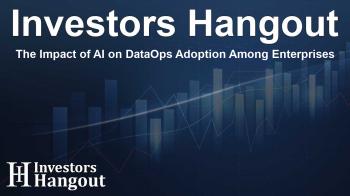The Impact of AI on DataOps Adoption Among Enterprises

AI Adoption Drives Transformations in DataOps Practices
As organizations increasingly embrace artificial intelligence (AI), a notable trend is emerging in enterprise data operations known as DataOps. This evolving practice focuses on orchestrating data integration and processing to ensure data quality and accuracy. A recent report by Information Services Group (ISG) highlights how the growing reliance on AI is influencing enterprises to adopt DataOps frameworks effectively.
Understanding DataOps in the Age of AI
DataOps combines agile development, DevOps, and lean manufacturing methodologies, empowering data engineering professionals to enhance data production. This approach not only streamlines data management but also improves responsiveness and reduces repetitive workloads within organizations. The ISG research suggests that by the end of 2026, a significant majority of enterprises will shift towards collaborative DataOps practices, underscoring its pivotal role in modern data strategies.
The Necessity of Healthy Data Pipelines
A crucial aspect of successful DataOps implementation relies on the establishment of healthy data pipelines. These pipelines facilitate proper data ingestion, processing, and loading, which are essential for generating actionable business insights. As the complexity of data sources and requirements increases, enterprises recognize the need to automate and monitor data pipeline creation, scheduling, and management.
Enhancing Business Value Through Data Orchestration
Data orchestration automates the flow of data to support operational and analytical initiatives, significantly driving business value. Forecasts indicate that by 2027, more than half of enterprises will adopt these technologies to enhance efficiency and agility in their data and analytics projects. This move reflects a broader trend towards automation in data management—essential for successful AI integration.
Key Drivers for DataOps Implementation
To unlock the full potential of DataOps, enterprises must shift their mindset towards embracing innovative people, processes, and information management strategies. The report emphasizes the importance of developing rapid innovation and experimentation processes, adopting automation tools, and ensuring high-quality data standards—vital for improving the effectiveness of data-driven initiatives.
Evaluating DataOps Providers
For 2024, ISG evaluated a range of software providers in five critical categories: DataOps, Data Observability, Data Orchestration, Data Pipelines, and Data Products. A comprehensive analysis of 49 providers revealed leaders in each category. The rankings for DataOps are as follows:
DataOps: Informatica, Microsoft, IBM
Data Observability: Monte Carlo, DQLabs, Acceldata
Data Orchestration: Databricks, Microsoft, Alteryx
Data Pipelines: Microsoft, Alteryx, Databricks
Data Products: Microsoft, Informatica, SAP
Empowering Data Scientists and Analysts
Mark Smith, a partner at ISG Software Research, underscores the necessity for enterprises to enable data operations across both business and IT teams. This empowerment enhances data scientists' and analysts' capabilities, driving efficiency in their workflows. The successful orchestration of data pipelines is crucial for streamlining AI development.
The Significance of ISG DataOps Buyers Guides
The ISG DataOps Buyers Guides are the culmination of extensive market and product research. ISG conducts this independent research to aid enterprises in optimizing their software investments, ensuring that their choices align with industry needs without external influences from software vendors.
About Information Services Group (ISG)
Founded in 2006, ISG is a prominent global technology research and advisory firm. With more than 900 clients, including leading enterprises across various sectors, ISG is committed to driving operational excellence and growth through digital transformation services. Their expertise spans AI, automation, cloud solutions, and thorough analysis of software and service market trends.
Frequently Asked Questions
What is DataOps and how is it influenced by AI?
DataOps is an agile data management approach that integrates data operations with AI technologies to enhance data quality and speed up analytics processes.
Which companies are leading in DataOps?
Informatica, Microsoft, and IBM are recognized as the leaders in DataOps according to ISG's latest evaluation.
Why are data pipelines important?
Data pipelines are crucial because they ensure that data is processed correctly and efficiently, which is necessary for generating useful business insights.
How does data orchestration contribute to business efficiency?
Data orchestration automates data workflows, allowing businesses to streamline processes and improve operational efficiency, ultimately leading to better decision-making.
What should enterprises prioritize for successful DataOps implementation?
Enterprises should focus on adopting innovative processes, enhancing collaboration among teams, and ensuring the quality of their data to make DataOps effective.
About Investors Hangout
Investors Hangout is a leading online stock forum for financial discussion and learning, offering a wide range of free tools and resources. It draws in traders of all levels, who exchange market knowledge, investigate trading tactics, and keep an eye on industry developments in real time. Featuring financial articles, stock message boards, quotes, charts, company profiles, and live news updates. Through cooperative learning and a wealth of informational resources, it helps users from novices creating their first portfolios to experts honing their techniques. Join Investors Hangout today: https://investorshangout.com/
Disclaimer: The content of this article is solely for general informational purposes only; it does not represent legal, financial, or investment advice. Investors Hangout does not offer financial advice; the author is not a licensed financial advisor. Consult a qualified advisor before making any financial or investment decisions based on this article. The author's interpretation of publicly available data presented here; as a result, they should not be taken as advice to purchase, sell, or hold any securities mentioned or any other investments. If any of the material offered here is inaccurate, please contact us for corrections.
